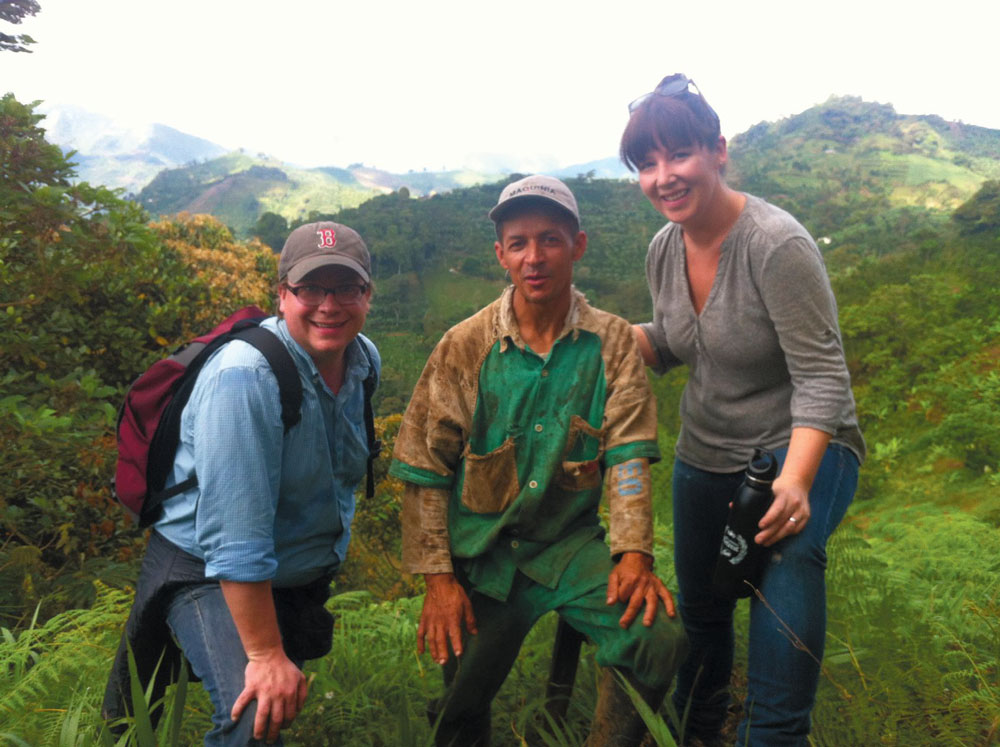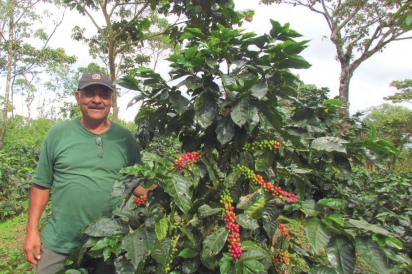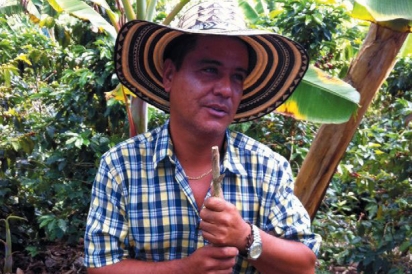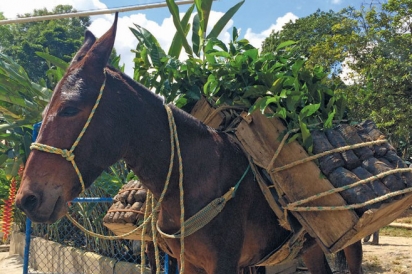Beacon Coffee Goes Beyond Fair Trade for Indigenous Coffee Farmers
When popular Ventura seamstress Elizabeth Cornejo attended a public tasting event at Beacon Coffee with a paper bag filled with 10 pounds of green coffee beans from her father's farm in Nicaragua, she and owners John and Jennifer Wheir had no idea what was to follow.
Elizabeth wanted to sell her father's coffee to her own customers and wondered if the Wheirs could roast the beans as well as offer their opinion on the flavor.
She had come to the right place: Launched in 2010, Beacon Coffee (BeaconCoffee.com) imports, roasts and sells coffee beans to retail partners, and has a small outlet where people can buy coffee and espresso drinks.
Turns out, the coffee was a rare varietal of maragogype, known as "elephant coffee" for the large size of its beans. John, a veteran roaster with decades of experience, was "blown away" by its quality. "I had never tasted this varietal with so much depth," he says.
They asked Elizabeth if she had more. Indeed, she had 700 pounds. A deal was struck to purchase a portion of those beans and then more, in the future.
A year later, in 2012, the Wheirs traveled to Nicaragua to meet her father, Fausto Cornejo, at his farm. They dubbed him and his coffee "Don" Fausto.
"'Don' is a joke between Fausto, John and myself," Jennifer says, explaining that "Don" is used as a sign of respect before someone's name. "During one of our many conversations, John referred to Fausto as 'Don Fausto,' and Fausto thought it was hilarious. We decided that would be the name of the coffee."
"After seeing the devastation that the roya [a rust fungus affecting coffee trees in all growing regions] took on Fausto's farm, we spent the rest of the time trying to figure out what was the best way to help," adds Jennifer. "Fausto shared his own frustration: He has now lost seven of his 12 total acres to roya."
Through it all, Fausto became one of their most cherished providers and a dear friend.
Their bond stems from a personal connection of seeing the hard work and dedication of Fausto's family and farming staff. Witnessing their financial hardships inspires the couple to go beyond the economic and sustainability requirements of the Fair Trade Certification movement when dealing with the Nicaraguan coffee farmer and other growers they've visited in Guatemala, Colombia and Costa Rica. (They also roast beans from El Salvador, Brazil and Ethiopia, and plan to visit coffee plantations there.)
"We became very close with the Cornejo family, especially during our visit. We stayed with them in their home, shared large family meals, and celebrated birthdays. They treated us as family and it was very emotional when it was time to say goodbye," says Jennifer.
"You see how much of themselves they put into what they do, the coffee we feel so lucky to have. I have so much respect for the producers that we work with. They are passionate, hardworking and proud. It is very important for John and me to carry on their passion and do right by them," she adds.
This respect for the producers motivates the Wheirs to follow fair trade practices, and then some.
"Fair trade coffee is just that – fair," explains Fair Trade USA's Jenna Larson, a spokesperson for the third-party certifier of Fair Trade products in North America.
"When you see the Fair Trade Certified label on a bag or cup of coffee, you know that farmers and workers earn a better income, work in safe conditions, protect the environment and are able to invest in much-needed projects like clean drinking water, education and health care."
It's important for customers, too, as demand for fair trade coffee continues to rise. In 2012 (the latest data available), Fair Trade Certified™ coffee imports into the United States and Canada topped 163 million pounds, an 18% increase over 2011, according to Fair Trade USA.
"Because fair trade sets a basement price, roughly correlating to the cost of production, we feel this is only a beginning step toward true sustainable coffee pricing," says John, adding that Beacon often pays three, four, even five times the amount of fair trade prices.
So why would a savvy businessperson pay more than the going rate?
For many reasons, explains John, including ensuring the sustainability of the farm, establishing a great bond with purveyors and rewarding quality.
"We look for farming and milling operations that put quality at the forefront of everything they do. In turn, we pay a premium for extremely high-quality coffees, year after year, with the same families," says John. Rewarding quality helps ensures that there is profit left over for more than just keeping the farm afloat, he adds.
The couple firmly believes that meeting the producers in person and being able to communicate with them face-to-face is important. During a roasting-day visit to their Ventura facility, I looked through the couple's eight- by 10-inch color photos of beans being sorted and graded at coffee plantations in idyllic Latin America settings. There were snaps of the smiling couple with the farmers they work with, source from and help support.
"Being able to share with them how much our customers truly enjoy their coffee is pretty incredible. Showing them a bag with their farm's name on it is a proud moment for both of us," says Jennifer.
Many of their relationships began decades ago while John was running the roasting department for the Allegro Coffee Company (owned by Whole Foods Market, Inc.). "It has been a wonderful thing to watch children grow into farm managers and take over the reins from their parents. I feel privileged to have been involved with certain farms for long enough to have witnessed the passing of responsibility from one generation to the next," he says.
They have begun working directly with Fausto in Nicaragua to improve the quality of his product through better milling practices. In the coming two crop cycles, they will help him develop a micromilling operation so the farm's coffee is finished appropriately, says John. It will also provide Fausto with a second source of income from helping his neighbors mill their coffee to a higher level.
"If the micro-milling takes off," says John, "there will be an opportunity for other farmers to process their coffee to a higher level. It's a long view, not a short one- or two-year turnaround."
Dealing with, and importing from, Latin America is no easy feat (I have done so, and my grandmother imported bananas in the early part of last century).
I had come to Beacon Coffee with expectations of wild travel tales about the couples' visits to farms in rural parts of Latin America.
Indeed, the couple has encountered some challenges, but none that have tempered their commitment to fairly compensate farmers in far-flung locales for their superior product.
GIVING BACK AT HOME
Beacon Coffee and Everybody's Hungry, an organization whose goal is hunger awareness, will launch an exclusive blend and label in late spring where a portion of the proceeds from each bag will be donated to FOOD Share. The two groups will create educational videos throughout the process of creating the blend, leading up to a release party at FOOD Share, which will include tours of the facilities and operation. The coffee will be available at the Beacon roasting plant, and its local retail partners that sell Beacon coffees.
In 2012, the Wheirs began selecting a local artist to create a label based on a coffee that "inspires" them. A dollar from the "art label" coffee goes to a fund for the artist.
Guillermo Figoli created the first artist label, an original work inspired by a cup of Beacon's Costa Rica Hacienda La Minita. This year's label will be chosen in late 2014, to coincide with the arrival of the new 2013 crop coffees, says Jennifer. Interested artists are invited to email her at jennifer@beaconcoffee.com.








